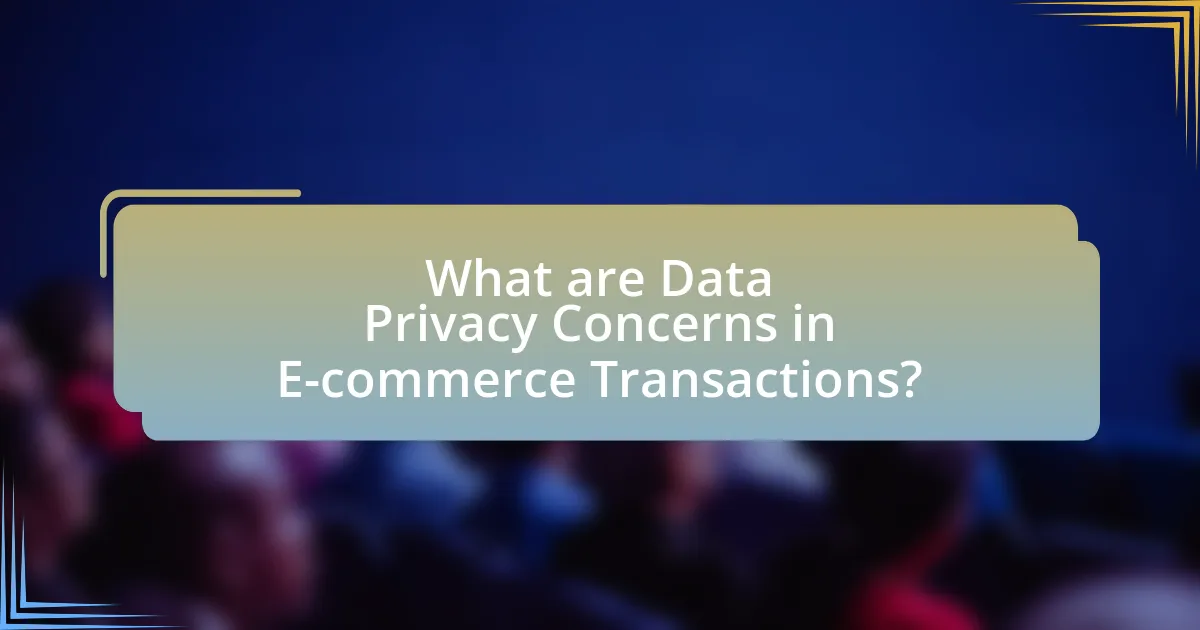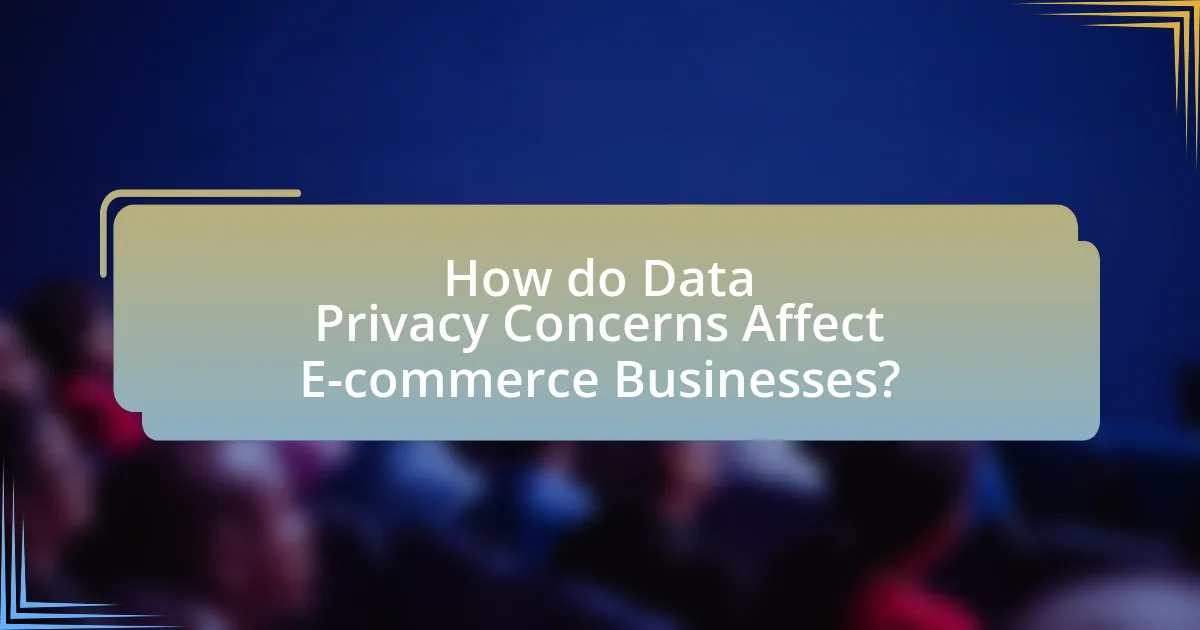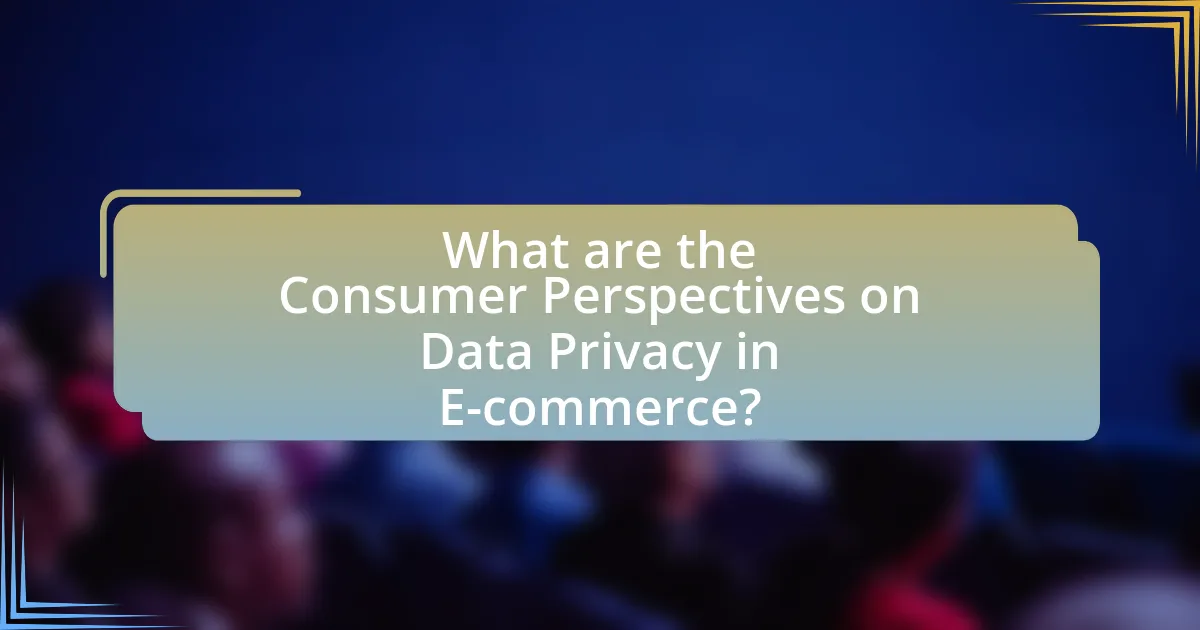Data privacy concerns in e-commerce transactions are critical for protecting personal and financial information shared by consumers. These concerns stem from the risks of data breaches and the financial implications associated with them, as highlighted by a 2021 IBM report estimating the average cost of a data breach at $4.24 million. Regulations such as the General Data Protection Regulation (GDPR) and the California Consumer Privacy Act (CCPA) impose strict guidelines on data handling, emphasizing the need for transparency and user consent. The article explores the significance of data privacy in influencing consumer trust, the types of data collected during transactions, the challenges faced by e-commerce businesses, and the best practices for both businesses and consumers to enhance data protection and compliance.

What are Data Privacy Concerns in E-commerce Transactions?
Data privacy concerns in e-commerce transactions primarily involve the protection of personal and financial information shared by consumers. These concerns arise from the risk of data breaches, where unauthorized parties may access sensitive information such as credit card numbers, addresses, and personal identification details. According to a 2021 report by IBM, the average cost of a data breach is approximately $4.24 million, highlighting the financial implications for businesses and consumers alike. Furthermore, regulations like the General Data Protection Regulation (GDPR) enforce strict guidelines on how companies must handle personal data, emphasizing the importance of transparency and user consent. These factors collectively underscore the critical nature of data privacy in maintaining consumer trust and ensuring compliance in e-commerce transactions.
Why are data privacy concerns significant in e-commerce?
Data privacy concerns are significant in e-commerce because they directly impact consumer trust and purchasing behavior. When consumers perceive that their personal information may be misused or inadequately protected, they are less likely to engage in online transactions. According to a 2021 survey by the Pew Research Center, 79% of Americans expressed concern about how their data is being used by companies, highlighting the importance of data privacy in influencing consumer decisions. Additionally, data breaches can lead to financial losses for both consumers and businesses, with the average cost of a data breach estimated at $4.24 million in 2021, according to IBM’s Cost of a Data Breach Report. This financial risk further underscores the critical nature of addressing data privacy concerns in the e-commerce sector.
What types of data are typically collected during e-commerce transactions?
During e-commerce transactions, various types of data are typically collected, including personal information, payment details, and transaction history. Personal information encompasses names, addresses, email addresses, and phone numbers, which are essential for order fulfillment and customer communication. Payment details include credit card numbers, expiration dates, and billing addresses, necessary for processing payments securely. Transaction history involves records of purchases, including items bought, quantities, and dates, which help businesses analyze consumer behavior and improve services. These data types are crucial for enhancing user experience and ensuring secure transactions in the e-commerce environment.
How do data privacy concerns impact consumer trust?
Data privacy concerns significantly diminish consumer trust. When consumers perceive that their personal information may be mishandled or exposed, they are less likely to engage with businesses, leading to decreased sales and customer loyalty. According to a 2021 survey by the Pew Research Center, 79% of Americans expressed concern about how their data is being used by companies, indicating a strong correlation between privacy apprehensions and trust levels. This lack of trust can result in consumers opting for competitors perceived as more secure, ultimately impacting a company’s reputation and bottom line.
What regulations govern data privacy in e-commerce?
The regulations that govern data privacy in e-commerce include the General Data Protection Regulation (GDPR) in the European Union, the California Consumer Privacy Act (CCPA) in the United States, and the Personal Information Protection and Electronic Documents Act (PIPEDA) in Canada. GDPR mandates strict guidelines for data collection and processing, requiring businesses to obtain explicit consent from users and ensuring the right to access and delete personal data. CCPA provides California residents with rights regarding their personal information, including the right to know what data is collected and the right to opt-out of its sale. PIPEDA establishes rules for how private sector organizations collect, use, and disclose personal information in the course of commercial activities. These regulations are designed to protect consumer privacy and enhance transparency in e-commerce transactions.
How do GDPR and CCPA influence e-commerce practices?
GDPR and CCPA significantly influence e-commerce practices by imposing strict regulations on data collection, processing, and user consent. E-commerce businesses must ensure transparency in how they handle personal data, requiring clear privacy policies and user consent mechanisms. For instance, GDPR mandates that companies obtain explicit consent from users before processing their data, while CCPA grants consumers the right to know what personal information is collected and the ability to opt-out of its sale. These regulations compel e-commerce platforms to adopt robust data protection measures, impacting their marketing strategies and customer relationship management. Compliance with these laws is essential, as non-compliance can result in substantial fines; GDPR fines can reach up to 4% of annual global revenue, while CCPA violations can incur penalties of up to $7,500 per violation.
What are the penalties for non-compliance with data privacy regulations?
Penalties for non-compliance with data privacy regulations can include substantial fines, legal action, and reputational damage. For instance, under the General Data Protection Regulation (GDPR), organizations can face fines up to €20 million or 4% of their annual global turnover, whichever is higher. Additionally, non-compliance may lead to lawsuits from affected individuals or regulatory bodies, further exacerbating financial and operational impacts. These penalties underscore the critical importance of adhering to data privacy laws in e-commerce transactions.

How do Data Privacy Concerns Affect E-commerce Businesses?
Data privacy concerns significantly impact e-commerce businesses by influencing consumer trust and purchasing behavior. When customers perceive that their personal information may be compromised, they are less likely to engage in online transactions. According to a 2021 survey by the Pew Research Center, 81% of Americans feel that the potential risks of companies collecting their data outweigh the benefits. This heightened awareness leads to increased demand for transparency and robust data protection measures from e-commerce platforms. Consequently, businesses that fail to prioritize data privacy may experience reduced sales, higher cart abandonment rates, and damage to their brand reputation.
What challenges do e-commerce businesses face regarding data privacy?
E-commerce businesses face significant challenges regarding data privacy, primarily due to stringent regulations and consumer expectations. Compliance with laws such as the General Data Protection Regulation (GDPR) and the California Consumer Privacy Act (CCPA) imposes complex requirements on businesses to protect customer data and ensure transparency. Additionally, the increasing prevalence of data breaches and cyberattacks heightens the risk of sensitive information being compromised, leading to potential financial losses and reputational damage. According to a report by IBM, the average cost of a data breach in 2021 was $4.24 million, underscoring the financial implications of inadequate data privacy measures. Furthermore, maintaining customer trust is crucial, as studies indicate that 81% of consumers are concerned about how their data is used, which can directly impact sales and customer loyalty.
How can data breaches affect an e-commerce company’s reputation?
Data breaches can severely damage an e-commerce company’s reputation by eroding customer trust and confidence. When sensitive customer information, such as credit card details or personal data, is compromised, consumers may perceive the company as negligent in protecting their data. According to a 2020 study by IBM, the average cost of a data breach is $3.86 million, and companies that experience breaches often see a significant decline in customer retention rates, with 29% of customers stating they would stop doing business with a company after a breach. This loss of trust can lead to negative publicity, decreased sales, and long-term damage to the brand’s image, making it challenging for the company to recover in a competitive market.
What are the financial implications of failing to protect customer data?
Failing to protect customer data can lead to significant financial implications for businesses, including direct costs from data breaches, regulatory fines, and loss of customer trust. For instance, the average cost of a data breach in 2023 was estimated at $4.45 million, according to the IBM Cost of a Data Breach Report. Additionally, companies may face regulatory fines, such as those imposed under the General Data Protection Regulation (GDPR), which can reach up to 4% of annual global revenue. Furthermore, loss of customer trust can result in decreased sales and long-term damage to brand reputation, with studies indicating that 81% of consumers would stop doing business with a company after a data breach. These factors collectively underscore the substantial financial risks associated with inadequate data protection measures.
How can e-commerce businesses enhance data privacy measures?
E-commerce businesses can enhance data privacy measures by implementing robust encryption protocols for data transmission and storage. Encryption protects sensitive customer information, such as payment details and personal data, making it unreadable to unauthorized users. According to a 2021 report by the Ponemon Institute, organizations that employ encryption experience 50% fewer data breaches compared to those that do not. Additionally, e-commerce platforms should adopt strict access controls and regularly update their security software to mitigate vulnerabilities. Regular employee training on data privacy best practices further strengthens these measures, as human error is a significant factor in data breaches.
What technologies can be implemented to safeguard customer data?
Technologies that can be implemented to safeguard customer data include encryption, firewalls, intrusion detection systems, and secure access controls. Encryption protects data by converting it into a coded format that can only be read by authorized users, ensuring confidentiality during transmission and storage. Firewalls act as barriers between trusted internal networks and untrusted external networks, preventing unauthorized access. Intrusion detection systems monitor network traffic for suspicious activities, allowing for timely responses to potential threats. Secure access controls, such as multi-factor authentication, ensure that only authorized personnel can access sensitive customer information. These technologies collectively enhance data security and mitigate risks associated with data breaches in e-commerce transactions.
How can businesses educate consumers about their data privacy practices?
Businesses can educate consumers about their data privacy practices by implementing transparent communication strategies. This includes providing clear privacy policies that outline data collection, usage, and protection measures, which can enhance consumer trust. According to a 2021 survey by the International Association of Privacy Professionals, 79% of consumers expressed a preference for companies that are transparent about their data practices. Additionally, businesses can utilize educational content such as blogs, webinars, and FAQs to explain complex privacy concepts in an accessible manner. Engaging consumers through interactive tools, like privacy settings dashboards, can also empower them to understand and control their data.

What are the Consumer Perspectives on Data Privacy in E-commerce?
Consumer perspectives on data privacy in e-commerce are characterized by significant concern and demand for transparency. A survey conducted by the Pew Research Center in 2021 revealed that 79% of Americans expressed concern about how their data is being used by companies. This indicates a strong desire for control over personal information and a preference for businesses that prioritize data protection. Furthermore, 64% of respondents stated that they have experienced a data breach, which heightens their apprehension regarding online transactions. These statistics underscore the critical role that data privacy plays in shaping consumer trust and purchasing decisions in the e-commerce landscape.
How do consumers perceive data privacy in online shopping?
Consumers perceive data privacy in online shopping as a significant concern that influences their purchasing decisions. Research indicates that 79% of consumers express anxiety over how their personal information is collected and used by online retailers. This apprehension is driven by high-profile data breaches and increasing awareness of data misuse, leading many shoppers to prioritize retailers that demonstrate strong data protection practices. Furthermore, a survey by the Pew Research Center found that 81% of Americans believe that the potential risks of data collection by companies outweigh the benefits. This perception underscores the importance of transparency and trust in e-commerce, as consumers are more likely to engage with businesses that clearly communicate their data privacy policies and practices.
What factors influence consumer decisions regarding data sharing?
Consumer decisions regarding data sharing are primarily influenced by privacy concerns, perceived benefits, trust in the data handler, and regulatory awareness. Privacy concerns arise from fears of data misuse and breaches, leading consumers to be cautious about sharing personal information. Perceived benefits, such as personalized services or discounts, can motivate consumers to share data if they believe the advantages outweigh the risks. Trust in the organization handling the data plays a crucial role; consumers are more likely to share information with brands they perceive as reputable and transparent. Additionally, awareness of regulations, such as GDPR, can impact consumer behavior, as individuals may feel more secure sharing data with companies that comply with stringent privacy laws.
How do privacy policies affect consumer purchasing behavior?
Privacy policies significantly influence consumer purchasing behavior by affecting trust and perceived risk. When consumers encounter clear and transparent privacy policies, they are more likely to feel secure about sharing personal information, which can lead to increased purchasing activity. A study by the Pew Research Center found that 79% of consumers are concerned about how their data is being used, indicating that privacy policies can either alleviate or exacerbate these concerns. Furthermore, research published in the Journal of Retailing shows that consumers are more likely to complete transactions on websites that provide detailed privacy information, as it enhances their confidence in the e-commerce platform. Thus, effective privacy policies can directly enhance consumer trust and drive purchasing decisions.
What are common misconceptions about data privacy in e-commerce?
Common misconceptions about data privacy in e-commerce include the belief that all data collected is shared with third parties, that encryption guarantees complete security, and that privacy policies are always followed. Many consumers think that e-commerce platforms automatically sell their data to advertisers, but in reality, reputable companies often use data internally to enhance user experience and comply with regulations like GDPR. Additionally, while encryption is a critical security measure, it does not protect against all forms of data breaches, such as those caused by human error or inadequate security practices. Lastly, privacy policies can be complex and may not always be adhered to, leading to a false sense of security among users.
How do myths about data privacy impact consumer trust?
Myths about data privacy significantly undermine consumer trust by creating misconceptions about how personal information is handled. For instance, the belief that all companies sell consumer data to third parties leads to skepticism and reluctance to engage in online transactions. According to a 2021 survey by the Pew Research Center, 79% of Americans expressed concern about how their data is being used by companies, indicating that these myths directly correlate with a lack of trust. When consumers feel uncertain about the security of their data, they are less likely to share personal information or complete purchases, ultimately affecting e-commerce performance.
What should consumers know about their rights regarding data privacy?
Consumers have the right to control their personal data, including how it is collected, used, and shared by businesses. This right is supported by various regulations, such as the General Data Protection Regulation (GDPR) in the European Union, which mandates that consumers must give explicit consent for their data to be processed and have the right to access, rectify, or delete their information. Additionally, consumers are entitled to be informed about data breaches and have the right to data portability, allowing them to transfer their data between service providers. These rights are essential for protecting consumer privacy in e-commerce transactions, ensuring transparency and accountability from businesses.
What best practices can consumers follow to protect their data in e-commerce?
Consumers can protect their data in e-commerce by following several best practices. First, they should use strong, unique passwords for each online account, as weak passwords can be easily compromised; a study by the Cybersecurity & Infrastructure Security Agency indicates that 81% of data breaches are linked to weak passwords. Second, consumers should enable two-factor authentication (2FA) whenever available, which adds an extra layer of security beyond just a password. Third, they must ensure that the websites they shop on use secure connections, identifiable by “https://” in the URL, as this encrypts data during transmission. Fourth, consumers should regularly monitor their bank and credit card statements for unauthorized transactions, as early detection can mitigate potential losses. Lastly, they should be cautious about sharing personal information and only provide what is necessary for the transaction, as excessive data sharing increases vulnerability to breaches.
How can consumers identify secure e-commerce websites?
Consumers can identify secure e-commerce websites by looking for specific indicators such as HTTPS in the URL, which signifies that the site uses SSL encryption to protect data. Additionally, secure websites often display trust seals from recognized security organizations, which validate their security measures. Research indicates that 85% of consumers are more likely to trust a website that displays these security indicators, reinforcing the importance of visible security features in online transactions.
What steps can consumers take to manage their online privacy effectively?
Consumers can manage their online privacy effectively by implementing several key strategies. First, they should use strong, unique passwords for different accounts and enable two-factor authentication whenever possible, as this significantly reduces the risk of unauthorized access. Additionally, consumers should regularly review and adjust privacy settings on social media and online services to limit data sharing.
Moreover, utilizing virtual private networks (VPNs) can help protect internet traffic from being intercepted, especially on public Wi-Fi networks. Consumers should also be cautious about the information they share online, avoiding oversharing personal details that could be exploited.
Finally, staying informed about data privacy laws and regulations, such as the General Data Protection Regulation (GDPR), empowers consumers to understand their rights regarding personal data. These steps collectively enhance online privacy and security.





